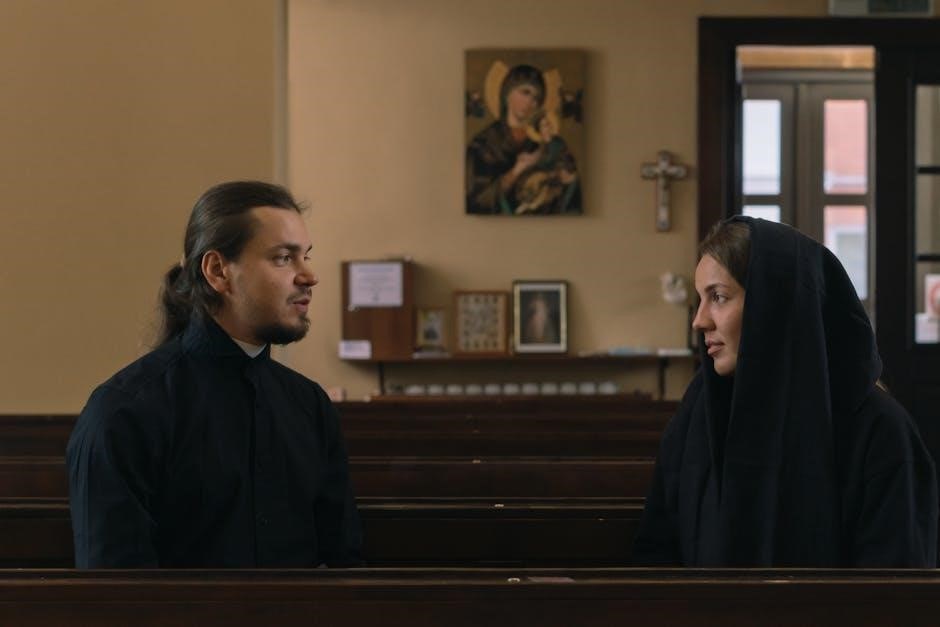
confession guide orthodox
Orthodox Confession is a sacred sacrament offering spiritual healing and growth through face-to-face repentance, fostering a deeper connection with God and His divine mercy.
What is Orthodox Confession?
Orthodox Confession is a sacred sacrament in which believers openly acknowledge their sins to a priest, seeking forgiveness and spiritual renewal. It is a face-to-face encounter, emphasizing repentance, healing, and reconciliation with God. The priest acts as a spiritual guide, offering wisdom and guidance. This practice fosters humility, accountability, and growth in faith, helping believers strive for holiness and a deeper connection with Christ.
The Purpose of Confession in the Orthodox Church
The primary purpose of Confession in the Orthodox Church is to seek forgiveness for sins, restore unity with God, and attain spiritual healing. It serves as a means to acknowledge one’s shortcomings, express true repentance, and receive divine mercy. Through this sacrament, believers are guided toward self-reflection, personal growth, and a deeper commitment to living a virtuous life. Confession also strengthens the community by reconciling individuals within the Body of Christ, fostering a collective journey toward salvation and eternal life.
How Often Should One Confess?
Regular confession is a vital commitment in the Orthodox Church, fostering spiritual growth and healing. Orthodox Christians are encouraged to confess at least once a year, typically during major fasting periods like Great Lent. However, many choose to confess more frequently, often monthly or bi-monthly, to continuously seek forgiveness and deepen their spiritual life. The frequency depends on individual circumstances, with guidance from a spiritual father. Frequent confession is seen as a means to regularly cleanse the soul and draw closer to God, ensuring a consistent journey toward repentance and salvation.

The Sacrament of Confession
The Sacrament of Confession is a divine mystery where Orthodox Christians seek forgiveness through repentance, guided by a priest, offering spiritual healing and reconciliation with God.
The Theology Behind the Sacrament
The sacrament of confession is rooted in Orthodox theology as a divine mystery where God forgives sins through the priesthood. It is based on Jesus’ words in John 20:21-23, granting the disciples authority to remit sins. The Holy Spirit acts through the priest to heal the penitent, restoring their unity with God and the Church. Confession is not merely a human act but a sacred encounter where God’s mercy is manifest. It reflects the Church’s role as a hospital for souls, emphasizing healing and reconciliation rather than judgment. This sacrament underscores the Orthodox belief in the transformative power of repentance and God’s boundless love.
The Role of the Priest in Confession
The priest in Orthodox Confession serves as a spiritual father, guide, and mediator of God’s mercy. Acting under the authority granted by Christ, the priest witnesses the penitent’s repentance and imparts forgiveness on behalf of God. The priest’s role is not to judge but to heal and guide the soul toward spiritual growth. They offer wisdom, encouragement, and, when necessary, penances to aid in the penitent’s spiritual recovery. The priest also ensures the sacrament is performed according to Orthodox tradition, emphasizing the Church’s teachings and the transformative power of repentance. Their presence embodies Christ’s promise to forgive sins, making them an essential vessel of divine grace and healing.
The Healing Aspect of Confession
Orthodox Confession is a sacrament of healing, restoring balance to the soul and reconciling the penitent with God. Through repentance, individuals seek forgiveness for sins, freeing themselves from spiritual burdens. The sacrament acts as a divine remedy, cleansing the heart and renewing the spirit. It addresses not only past mistakes but also strengthens the believer against future temptations. The priest, as a spiritual physician, guides the penitent toward inner peace and harmony with God. This healing process fosters humility, self-awareness, and a deeper commitment to living a virtuous life. Confession, therefore, is not merely a ritual but a transformative experience that rejuvenates the soul and draws one closer to Christ.
Preparation for Holy Confession
Preparation involves prayerful self-examination, identifying sins, and reflecting on thoughts, words, and actions. Writing down sins ensures clarity and thoroughness during confession, fostering genuine repentance and healing.
Prayerful Examination of Conscience
A prayerful examination of conscience is a vital step in preparing for Holy Confession. It involves reflecting on one’s thoughts, words, and actions, seeking to identify sins and areas for spiritual growth. This process begins with prayer, asking God for clarity and humility to see one’s shortcomings. Orthodox Christians are encouraged to examine their feelings, attitudes, and habits, ensuring sincerity in their repentance. Specific questions, such as those related to material attachment, selfishness, and greed, can guide this reflection. Writing down sins helps in being thorough and honest during confession. This prayerful self-examination fosters a deeper awareness of one’s spiritual state and readiness to seek forgiveness and healing through the sacrament.
Questions for Self-Examination
Questions for self-examination are a crucial tool in preparing for Holy Confession. They help individuals identify sins and spiritual weaknesses, guiding them to reflect on their actions, thoughts, and feelings. These questions cover various aspects of life, such as materialism, selfishness, greed, honesty, and family responsibilities. For example, one might ask, “Have I been attached to worldly items?” or “Have I cheated or caused others to steal?” Such inquiries encourage honesty and self-awareness. They also help evaluate one’s commitment to faith, asking about prayer, fasting, and attendance at church services. By addressing these questions, believers can recognize patterns of sin and prepare for sincere repentance, fostering spiritual growth and a deeper connection with God.
Writing Down Sins for Clarity
Writing down sins for clarity is a recommended practice in Orthodox confession, helping individuals recall and honestly acknowledge their transgressions. By documenting specific sins immediately after committing them, believers avoid forgetting and ensure a thorough confession. This method encourages accountability and sincerity, allowing penitents to present their sins clearly to the priest. It also aids in identifying recurring patterns of sin, fostering deeper self-awareness and repentance. The list should be reviewed before confession to ensure accuracy and completeness. This practice, as outlined in guides like If We Confess Our Sins, promotes a meaningful and transformative experience, helping individuals grow spiritually and draw closer to God through genuine repentance and forgiveness.
Prayers of Repentance Before Confession
Prayers of repentance before confession are essential for preparing the heart and mind to seek forgiveness. Orthodox Christians often recite prayers such as “Forgive me, Lord Jesus Christ, our God,” seeking divine mercy and cleansing. These prayers, found in Orthodox prayer books, help individuals acknowledge their sinfulness and express genuine remorse. Reciting them fosters humility and readiness to confess openly. They also serve as a reminder of God’s boundless love and willingness to forgive. By praying before confession, believers align their spirit with the sacrament’s purpose, ensuring a sincere and transformative experience. This practice, as emphasized in guides like If We Confess Our Sins, deeply enriches the confession process and spiritual growth.

The Confession Process
The confession process involves face-to-face dialogue with the priest, prayerful self-examination, and sincere expression of sins, fostering repentance and spiritual renewal in the Orthodox tradition.
Face-to-Face Confession in the Orthodox Tradition
In the Orthodox Church, confession is conducted face-to-face, often with the same confessor, fostering a personal and direct relationship. This practice emphasizes accountability and spiritual guidance, encouraging openness and honesty. The penitent stands before the priest, typically in the presence of an icon, symbolizing God’s mercy. This intimate setting allows for tailored advice and prayer, deepening the penitent’s journey toward repentance and healing. Unlike anonymous confession, this method builds trust and continuity in spiritual growth, reflecting the Church’s emphasis on community and personalized faith journeys.
The Priest’s Questions During Confession
The priest asks questions during confession to uncover hidden sins and guide the penitent toward repentance. These inquiries focus on thoughts, words, and deeds, helping to reveal unacknowledged spiritual struggles. The priest may ask about prayer life, love for others, and attachment to material goods, as well as family relationships and honesty in daily interactions. The goal is not to judge but to assist the penitent in understanding the depth of their sins and their impact on the soul. Through these questions, the priest provides tailored advice and prayers, fostering a path to healing and spiritual renewal. This dialogue is a cornerstone of Orthodox confession.
The Penitent’s Role in the Confession
The penitent plays a vital role in Orthodox confession by approaching the sacrament with honesty, openness, and a willingness to confront their sins. They must prepare thoroughly, prayerfully examining their thoughts, words, and actions to identify areas of spiritual weakness. This self-reflection helps the penitent take full responsibility for their transgressions, fostering genuine repentance. During confession, the penitent should avoid excuses or justifications, instead acknowledging their faults humbly and seeking forgiveness with a sincere heart.
By actively engaging in this process, the penitent contributes to their own spiritual healing and growth. Their role is not passive but participatory, requiring courage and a commitment to change. Through this, they embrace the transformative power of confession.

Prayers and Repentance
Prayers and repentance are essential in Orthodox confession, guiding the penitent to seek forgiveness and spiritual renewal through heartfelt supplications, ensuring a sincere and transformative experience.
Prayers to Say Before Confession
Prayers before confession are crucial for preparing the heart and mind. They include petitions for forgiveness, such as “Forgive me, Lord Jesus Christ,” seeking divine mercy and guidance. These prayers help the penitent reflect on their sins and approach confession with humility. It is recommended to pray to the Holy Spirit for enlightenment and to the Mother of God for intercession. Writing down sins and reciting specific prayers ensures a thorough confession, fostering a sincere desire for repentance and spiritual renewal. Regular prayerful preparation enhances the sacrament’s transformative power, drawing the believer closer to God and His healing grace.
Prayers of Thanksgiving After Confession
After confession, prayers of thanksgiving express gratitude for God’s mercy and forgiveness. These prayers, such as “O Lord, baptize me with the Holy Spirit” and “I thank you, O Lord, for the absolution of my sins,” reflect humility and joy. They acknowledge the healing grace received through the sacrament. Praying these words helps the penitent embrace renewal and strengthens their commitment to spiritual growth. Such prayers are a heartfelt response to God’s love, fostering a deeper connection with Him and reinforcing the transformative power of confession. Regularly reciting these prayers after confession nurtures a spirit of gratitude and devotion, guiding the believer toward a life of repentance and holiness.
The Importance of True Repentance
True repentance is the heart of Orthodox confession, requiring sincere remorse for sins and a firm resolve to change. It involves a deep examination of conscience, acknowledging wrongdoing, and seeking forgiveness from God and others. Repentance is not merely verbal but a spiritual transformation, guided by the Holy Spirit. It fosters humility, healing, and renewal, drawing the believer closer to God. Without genuine repentance, confession remains incomplete, lacking the power to transform the soul. Through true repentance, one experiences the mercy of God and embarks on a lifelong journey of spiritual growth, striving to live according to His will and commandments.

Spiritual Guidance and Support
Spiritual guidance is essential for Orthodox Christians, offering direction through confession and fostering a deeper faith journey with personalized advice from experienced confessors and mentors.
Choosing a Spiritual Father or Confessor
Choosing a spiritual father or confessor is a crucial step in the Orthodox faith, requiring careful consideration and prayer. It is important to select a priest who embodies wisdom, compassion, and a deep understanding of the Orthodox tradition. He should be someone with whom you feel comfortable sharing your spiritual struggles and joys, fostering trust and openness. Regular communication and guidance from a spiritual father can provide clarity and strength on your journey toward spiritual growth and repentance. This relationship is vital for navigating life’s challenges and deepening your connection with God.
The Role of the Confessor in Spiritual Growth
The confessor plays a vital role in spiritual growth by offering guidance, wisdom, and support. They help believers recognize and overcome sinful tendencies, fostering repentance and healing. Through regular confession, the confessor provides tailored advice, prayers, and encouragement, aiding in the development of a deeper relationship with God. Their role is not only to absolve sins but also to nurture spiritual maturity, helping individuals navigate life’s challenges with faith and integrity. A compassionate and experienced confessor can significantly enhance one’s journey toward holiness, serving as a bridge between the penitent and God’s divine grace.
Regular Confession for Spiritual Health
Regular confession is essential for maintaining spiritual health and fostering a deeper connection with God. It allows believers to consistently repent, seeking forgiveness and healing for their sins. By confessing regularly, individuals prevent sin from taking root in their lives, fostering spiritual growth and accountability. This practice encourages self-reflection, humility, and a commitment to living according to God’s will. Regular confession also provides an opportunity to receive guidance from a spiritual father, helping to navigate life’s challenges with faith and integrity. Ultimately, it is a vital tool for cleansing the soul and drawing closer to Christ, ensuring ongoing spiritual renewal and strength.
Common Mistakes and Solutions
Common mistakes in confession include overlooking sins, dishonesty, and reluctance. Solutions involve self-awareness, honesty, and seeking spiritual guidance to deepen repentance and foster genuine healing.
Overlooking Sins During Confession
Overlooking sins during confession is a common mistake that hinders spiritual growth. It often stems from forgetfulness or a lack of self-awareness. To avoid this, prepare a list of sins committed, reflecting on thoughts, words, and actions. Prayerful examination and seeking guidance from a spiritual father can enhance introspection. Regular self-reflection helps identify patterns of sinfulness. Remember, confession is a healing sacrament, and honesty is essential for true repentance; By being thorough and sincere, one can fully benefit from the mercy and grace offered through the sacrament, fostering a deeper connection with God and His divine forgiveness.
Being Dishonest or Superficial
Being dishonest or superficial during confession undermines its spiritual purpose. Withholding sins or not fully disclosing them prevents genuine healing and growth. Superficiality, such as rushing through the sacrament without introspection, can lead to a lack of true repentance. This approach fails to engage the heart and mind, reducing confession to a mere formality. To overcome this, one must prepare thoroughly, reflecting on sins and their impact. Prayerful examination and sincerity are essential for a meaningful confession. The priest, as a spiritual guide, can help uncover deeper issues, but honesty and openness are the penitent’s responsibility. True repentance requires vulnerability and a willingness to confront one’s sins fully.
How to Overcome Reluctance to Confess
Overcoming reluctance to confess requires prayer, self-awareness, and trust in God’s mercy. Begin by acknowledging the natural fear of judgment and remind yourself that confession is a healing sacrament. Seek God’s assistance through prayer, asking for courage and sincerity. Reflect on the purpose of confession—to restore unity with God and gain spiritual strength. Understanding that the priest acts as a healer, not a judge, can ease fears. Prepare by writing down sins and praying for repentance. Approach confession with humility, knowing it is a step toward spiritual growth. Regular practice fosters familiarity and reduces hesitation, allowing the sacrament to become a source of comfort and renewal.
Orthodox Confession is a sacred journey of repentance, healing, and renewal, restoring unity with God and fostering spiritual growth through sincere faith and regular participation.
The Transformative Power of Confession
Confession in the Orthodox Church holds profound transformative power, offering spiritual healing and renewal. Through sincere repentance, believers experience reconciliation with God and His Church, restoring their spiritual health. The sacrament cleanses the soul, enabling a deeper connection with divine grace. Regular confession fosters humility, self-awareness, and growth in holiness, guiding individuals toward a more Christ-like life. It is a powerful tool for overcoming sin and achieving inner peace, emphasizing God’s boundless mercy and love. By confronting and confessing sins, the faithful embark on a journey of continuous transformation, drawing closer to God and living in accordance with His will. This sacred practice is essential for spiritual vitality and eternal salvation.
Encouragement for Regular Participation
Regular participation in Orthodox Confession is essential for spiritual growth and health. By confessing regularly, believers experience a profound cleansing of the soul, drawing closer to God and overcoming sin. This sacrament fosters humility, self-awareness, and a deeper relationship with Christ. Encouraging frequent confession helps individuals embrace repentance as a lifelong commitment, not a burden. It strengthens faith, provides clarity in spiritual struggles, and nurtures a heart of gratitude. Through consistent practice, one grows in holiness and finds inner peace. The Church urges the faithful to approach confession with sincerity, trusting in God’s mercy and transformative grace. Regular confession is a vital step toward eternal salvation and a vibrant spiritual life.
Resources for Further Study
For a deeper understanding of Orthodox Confession, several resources are available. The guide If We Confess Our Sins: A Practical Guide to Confession by the Orthodox Church of America offers insightful tips and prayers. Additionally, online resources like the Department of Religious Education provide lists of sins and self-examination questions. Books on Orthodox spirituality, such as works by Metropolitan Kallistos Ware, explore the sacrament’s theology. Many church websites also offer confession guides, prayerful reflections, and articles on spiritual growth. These resources help believers prepare for confession and embrace repentance as a transformative journey toward healing and holiness in Christ.